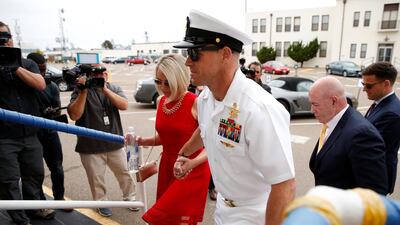A US jury on Tuesday will begin the first full day of deliberations in the case of a decorated Navy Seal charged with murdering a wounded war prisoner in Iraq.
Closing arguments wrapped up Monday at the court-martial of Special Operations Chief Edward Gallagher, who has pleaded not guilty.
A military prosecutor in a California court asserted the proof of Mr Gallagher's guilt is his own words, his own photos and the testimony of his fellow troops, while defence lawyers called the case a "mutiny" by entitled, junior Seals trying to oust a demanding chief.
Both sides told jurors that witnesses had lied on the stand and it was their duty to push through the evidence to find the truth. The panel will weigh whether Mr Gallagher, a 19-year veteran on his eighth deployment, went off the rails and fatally stabbed the war prisoner on May 3, 2017, as a kind of trophy kill, or was the victim of allegations fabricated after the platoon returned to San Diego to stop him from getting a Silver Star and being promoted.
The jury is made up of five Marines and two sailors, including a Seal, many of whom had been in heavy combat in Iraq.
The two-week trial included the testimonies of nearly a dozen Seals, including Special Operator Corey Scott, a medic like Mr Gallagher, who told the court that he saw the chief stab the ISIS militant in the neck but stunned the court when he said he was the one who ultimately killed the prisoner by plugging his breathing tube with his thumb as an act of mercy.
Seven Seals said Mr Gallagher unexpectedly stabbed the prisoner moments after he and the other medics treated the detainee. Two, including Mr Scott, testified they saw Mr Gallagher plunge his knife into the prisoner's neck.
Under the military justice system, the prosecution needs two-thirds of the jury, or in this case five jurors, to agree to a guilty verdict to convict. Jurors can also convict him of lesser charges or acquit him.
Navy Cmdr Jeff Pietrzyk said in closing arguments that text messages by Mr Gallagher show he is guilty.
One message said: "I've got a cool story for you when I get back. I've got my knife skills on." Another text stated: "Good story behind this. Got him with my hunting knife."
He then showed a photo of the dead prisoner with Mr Gallagher holding up his head by the hair.
"The government's evidence in this case is Chief Gallagher's words, Chief Gallagher's pictures, Chief Gallagher's Seals," Cmdr Pietrzyk said.
The prosecutor said the witness who changed his story and claimed to have killed the prisoner himself was lying to protect Mr Gallagher.
He acknowledged that the victim – a 17-year-old ISIS fighter wounded in an airstrike – is not sympathetic.
"Before the air strike, he would have done anything in his power to kill an American," Cmdr Pietrzyk said, but he said the care of war prisoners is what sets US forces apart.
"We're not ISIS. When we capture someone and they're out of the fight, that's it. That's where the line is drawn," Cmdr Pietrzyk said.
During the trial, it was revealed that nearly all the platoon members readily posed for photos with the dead prisoner and watched as Mr Gallagher read his reenlistment oath near the body in an impromptu ceremony.
Defence lawyer Tim Parlatore began his closing argument the same way he started the trial. "This is case is not about murder, it's about mutiny," Mr Parlatore said.
The attorney said there was no body, no forensics, and the Seals who testified against Mr Gallagher lied because they didn't like his demanding leadership. He called the pictures of Mr Gallagher clutching the corpse's hair and his texts about his knife skills just the dark humour of a warrior.
Mr Parlatore also contended that investigators never asked Mr Scott about the cause of the death, which is why they were surprised by his testimony.
The defence showed video clips by an Iraq TV crew of the prisoner being interviewed after he was hit, then arriving at the Seal compound and being handed over to the Seals by the Iraqi troops. It also showed Mr Gallagher pulling out his medical bag and treating the detainee.
Mr Gallagher's attorneys said there are a number of things that could have caused the militant's death, including internal injuries from the blast.

